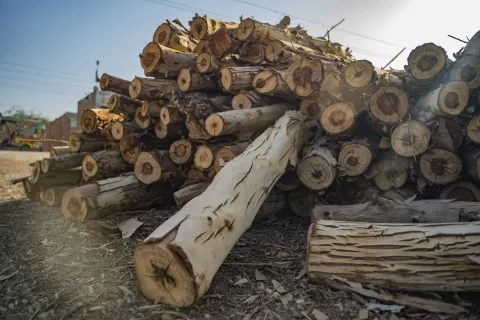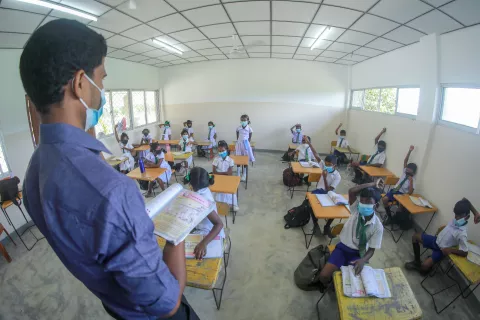Since starting as Regional Director for UNICEF South Asia in June 2023, I’ve felt a profound sense of pride and responsibility to be serving the 625 million children of the region that I call home.
Sri Lanka has always been home — and the unique challenges children face here are close to my heart. So, my first field visit to Sri Lanka as Regional Director carried a particular emotional weight.
COVID-19 and last year’s economic crisis have hit Sri Lankan families hard — especially the poorest. On this field visit I would meet some of these families, listen to them, and witness some of the incredible work that UNICEF is doing to support children.
My first stop was Punchi Situm Preschool in Sabaragamuwa Province, attended by just 15 students, aged between 3 and 5. Their parents are mainly daily wage labourers who struggled during the economic crisis as prices skyrocketed, wages stagnated, and jobs disappeared.
During that time, many children struggled to bring to school the kind of food they needed. Many families were skipping meals. In short, children weren’t receiving the nutrition they needed to grow, develop, stay healthy and concentrate in school.
Since November 2022, UNICEF has been providing warm mid-morning meals here. They’re simple meals but they’re nutritious: rice, vegetables, soya, curry and dhal to fuel children’s bodies and feed their minds.

The smiles on the children’s faces as I helped staff serve the mid-morning meal said it all. As they tucked in, I talked to their teachers about how these meals energize them and get them learning. School attendance is up, and the place was filled with happy, engaged children learning and playing.
And that was just one school. UNICEF is supporting over 1,500 schools in Sri Lanka with mid-morning meals for children largely from poor households and in areas that face the highest risk of malnutrition. Thinking about the difference these simple meals are making to children’s lives was really humbling.
Our next stop was Dombagaswinna primary school. The 43 students here have faced huge challenges to their learning from COVID-19 closures, compounded by the economic crisis.
Sri Lanka had some of the longest school closures in the world. Just as things were returning to normal, the economic crisis set in. Fuel scarcity and the high cost of learning materials stopped students and teachers from going to school regularly and robbed them of the opportunity to learn.
The students here are children of struggling farmers and daily wage workers labourers. Their learning has been hit particularly hard. The low wages from daily work meant their families’ incomes were already vulnerable. But climate variations and continuous rains have made regular farmwork a thing of the past. It’s become almost impossible to scrape together a living. This means these children have missed a lot of school and lost a lot of learning.
When I visit, UNICEF has been supporting the school for nearly a year with learning kits for students and teachers. We took some with us on our visit – much to everyone’s delight!
The kits include basic educational supplies like exercise pads and drawing books, pens and pencils. They mean so much to children – and parents feel relief that they don’t need to worry about that expense.
With these tools they can start to recover lost learning, cultivate their talents and express their creativity.

In an incredibly moving moment, I was approached by a young student who shyly presented me with a portrait he had drawn – a portrait that looked very much like me! What do you think?
I was speechless for a moment at the touching gesture and the student’s clear talent. As I thanked him for his gift, I realised how much he must think of UNICEF to give it me. I was also reminded of the old maxim: Talent is universal, but opportunity is not.
These learning kits are a drop in the ocean. But I was proud that UNICEF is able to support his teachers, doing all they can to encourage children and give them opportunities to develop their talents.

There’s evidence of this talent and joy for learning in the art adorned across all the classroom walls. I was inspired by Ms. Harshani Anoja Weerasinghe, who's been going out of her way to make sure children are learning in a fun, high energy and innovative way.
She told me that during the COVID-19 closures, a lot of her Grade 1 students missed lessons and started to forget shapes such as squares and triangles. So, she created a ‘shapes song and dance’ for them. The class performed the song and danced for us, and we joined in -- as best we could!
I was struck, once again, by the enthusiasm and passion of the teachers I have met across South Asia. They’re not doing the role as a job; they’re doing it as a calling. They transform school into a place where children can discover their potential; it’s a beacon of hope in an often-bleak landscape.
If we can harness this and support teachers a little more, the opportunities that could come as a result are vast.
That’s why I’m excited that UNICEF will continue to support this school through a recovery programme that helps pupils make up lost learning time by supporting teachers through specialised training on a long-term basis.

Next up was the most affecting and heartbreaking part of the trip. We visited two families receiving cash assistance through one of UNICEF’s programmes designed to support the poorest families with young children.
Through the programme, families receive Rs. 6,750.00 per month (around $20.00), per eligible child for four months. Because these families often face intersecting vulnerabilities, UNICEF helps them in related areas too, including opening bank accounts and accessing health and nutrition services.
The first mother we spoke to was Mrs. Nagappam Lechchami who has five children. The family rely on her husband’s income from daily labour in the mines. But the economic crisis and recent rainfall has interrupted mining work, leaving the family living hand to mouth.
The rains have also forced them from their home. Their makeshift house of clay was damaged by the floods, leaving them living in appalling, unhygienic conditions. They stayed as long as they could, but when their youngest child developed rashes on his legs and feet, they sought refuge with an extended family member. This is where we met them.
They told us how they’d been receiving cash payments for their children, aged one and two, for the last two months. They’d used the money for food and medical attention for their children. The support had also greatly improved the family's overall well-being.
But I was saddened to learn that one of Nagappam’s older children has not been to school for the last three years. She explained that the family were forced out from their former work in a plantation by an abusive manager. When she came to enrol her son at a new school, they requested the paperwork from the old school, which she couldn’t get because she couldn’t return to the plantation. Without the paperwork, her son had been unable to start school. It was heartbreaking to hear.
The family were being reached by the social support system in some areas but falling through the cracks in others.
They may have been supported to set up a bank account, see the midwife and receive a cash grant, but the system had been unable to fully support them to get their child into school. And, before they knew it, three years had gone by.
I left reflecting on how we must strengthen the links between social services to make sure they’re talking to each other and fully protecting the most vulnerable children in society.

This resolve was only strengthened when meeting the next family receiving cash assistance.
31-year-old Mrs. Chaturani Priyadarshani has three children aged between two and seven. She’s separated from her husband and the family currently lives with her mother, Ms. Sitha Handige Indralatha, in a village in Ratnapura District.
Mrs. Priyadarshani suffers from health problems. So, her mother, Ms. Indralatha, a 64-year-old grandmother to six, is the sole breadwinner for the whole family.
But her earnings from caring for an older person don't stretch far. The family are scraping by with just enough food to survive. Proper nutrition is a luxury they cannot afford.
Not only has Ms. Indralatha been providing for the whole family, she’s also been holding it together – handling the dynamics of a separated family, protecting them and dealing with threats from the electricity board to cut off the family’s one household light. Everything depends on her.
Yet she recounts the family’s struggles to me with a shy smile. She’s proud to be able to support them all.
Her resilience and drive, with very little support, have kept the family’s head above water. In a different context, she would have been a CEO of a company.
The family has been receiving cash assistance for one of her daughter’s children for two months. It has allowed the family to feed the children more nutritious food and helped to take the pressure off Ms. Indralatha a little.
In this respect, one part of the social system is supporting them. They’ve also been able to access health support for Mrs. Priyadarshani and get nutrition advice. But in other areas, like social services and negotiating with the electricity board, they’ve been left to struggle alone.
Ms. Indralatha is not short of strength or resilience. What she needs is for social systems to work together, so she can use them to improve her family’s life.

Sadly, Sri Lanka’s economic crisis is not yet over. The economy's still shrinking and is unlikely to pick up until next year. It’s a long time for struggling families to survive, especially the poorest.
Social protection is a lifeline for them that must be strengthened.
Before the economic crisis, Sri Lanka was on the cusp of becoming an upper middle-income country. It had fairly strong social protection, health and education systems. We need to make sure that where the systems do exist, they are connected and work together, so that the families who need them most don’t fall through the cracks.
To do this, there need to be increased budgets and spending across social sectors, and we need to identify those barriers that stop the poorest people from taking advantage of them.
Sri Lanka is a country full of resilience, courage, creativity and hope. And as I’ve seen throughout my mission here, when families have the services to support them, the results for children can be lifechanging.









